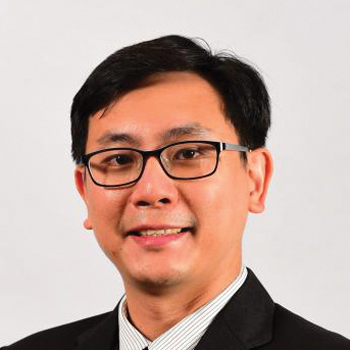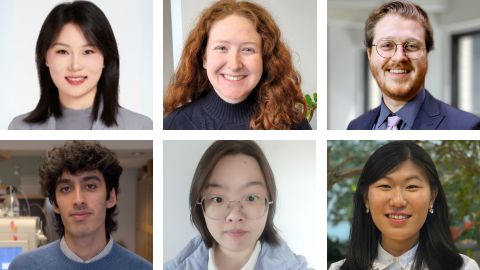Chng a ‘rising star’ in bacterial membrane lipid research
Shu-Sin Chng, a professor in the department of chemistry at the National University of Singapore, has been awarded the American Society for Biochemistry and Molecular Biology’s 2019 Walter A. Shaw Young Investigator Award. The award recognizes Chng’s work on outer membrane biogenesis in Gram-negative bacteria and mycobacteria.
In her letter supporting Chng’s nomination for the award, Tracy Palmer of Newcastle University wrote that his research has made “an outstanding contribution to our understanding of bacterial lipid trafficking” and that Chng “has already cemented himself as a world leader in his field.”
 “I am extremely excited and honored to receive the Walter Shaw Young Investigator Award in Lipid Research. I am deeply indebted to my mentors Daniel Kahne and Jonathan Beckwith for providing exceptional training, friendship and support throughout my career. I am also very grateful to my postdocs and students past and present for their commitment, patience and hard work — this success also belongs to them!” — Shu-Sin Chng
“I am extremely excited and honored to receive the Walter Shaw Young Investigator Award in Lipid Research. I am deeply indebted to my mentors Daniel Kahne and Jonathan Beckwith for providing exceptional training, friendship and support throughout my career. I am also very grateful to my postdocs and students past and present for their commitment, patience and hard work — this success also belongs to them!” — Shu-Sin Chng
The outer membrane of Gram-negative bacteria has a unique composition compared to the inner membrane. While mechanisms for outer membrane protein and glycolipid transport and assembly have been well defined, how glycerophospholipids are transported to and from the outer membrane was largely unknown. Chng has investigated how phospholipids are transported by the OmpC-Mla system, which is important for the maintenance of outer membrane lipid asymmetry in Escherichia coli. The Mla system had been described previously, but Chng identified a new component OmpC, defined the biochemical mechanisms of this system and demonstrated that it did in fact transport lipids. The Chng lab also reported that the Tol-Pal complex, first defined over 50 years ago, is involved in phospholipid transport. In what Palmer described as a “profound discovery,” Chng’s group demonstrated that this complex is important for the retrograde transport of phospholipids from the outer to inner membrane and is thus required for outer membrane lipid homeostasis in Gram-negative bacteria.
Chng also investigates mycobacteria, which have evolved an outer membrane rich in mycolic acids. Mycobacteria are notoriously hard to work with, yet Chng was able to describe how mycolic acids are flipped by a protein called MmpL3, as well as how MmpL3 is the direct target for small molecule inhibitors. Mycolic acid synthesis is an important pathway for targeted antibiotic therapies. Thus, Chng’s research on lipid transport in mycobacteria could lay the groundwork for improved therapies against mycobacterial infection.
Jean-Francois Collet of the Université catholique de Louvain nominated Chng for the award. “The importance of his work is greatly amplified given that the bacterial (outer membrane) is a prime target for the development of novel antibiotics, especially in the context of combat against multidrug resistant ‘superbugs,’” Collet wrote in his nomination letter.
Hiroshi Nikaido, of the University of California, Berkeley, wrote in support of the nomination that he “was struck by both the range of Dr. Chng’s work as well as the creativity and originality in his studies,” while Stephen Trent of the University of Georgia called Chng “a rising star.”
Chng received his Ph.D. in chemistry at Harvard University in 2010, and he remained at Harvard as a postdoctoral fellow. In 2011, he joined the department of chemistry at the National University of Singapore. He is also a visiting professor at the Singapore Center on Environmental Life Sciences and Engineering.
Chng will receive his award during the ASBMB annual meeting at the Experimental Biology 2019 conference in Orlando, where he will deliver an award lecture titled “Bacterial lipid trafficking and outer membrane homeostasis” at 1:45 p.m. April 8 in Valencia Ballroom A at the Orange County Convention Center.
Enjoy reading ASBMB Today?
Become a member to receive the print edition four times a year and the digital edition monthly.
Learn moreGet the latest from ASBMB Today
Enter your email address, and we’ll send you a weekly email with recent articles, interviews and more.
Latest in People
People highlights or most popular articles

Richard Silverman to speak at ASBMB 2025
Richard Silverman and Melissa Moore are the featured speakers at the ASBMB annual meeting to be held April 12-15 in Chicago.

Women’s History Month: Educating and inspiring generations
Through early classroom experiences, undergraduate education and advanced research training, women leaders are shaping a more inclusive and supportive scientific community.

ASBMB honors Lawrence Tabak with public service award
He will deliver prerecorded remarks at the 2025 ASBMB Annual Meeting in Chicago.

ASBMB names 2025 JBC/Tabor Award winners
The six awardees are first authors of outstanding papers published in 2024 in the Journal of Biological Chemistry.

Daniel N. Hebert (1962–2024)
Daniel Hebert’s colleagues remember the passionate glycobiologistscientist, caring mentor and kind friend.

In memoriam: Daniel N. Hebert
He was a professor at the University of Massachusetts Amherst, who discovered the glycan code that facilitates protein folding, maturation and quality control in the endoplasmic reticulum.

